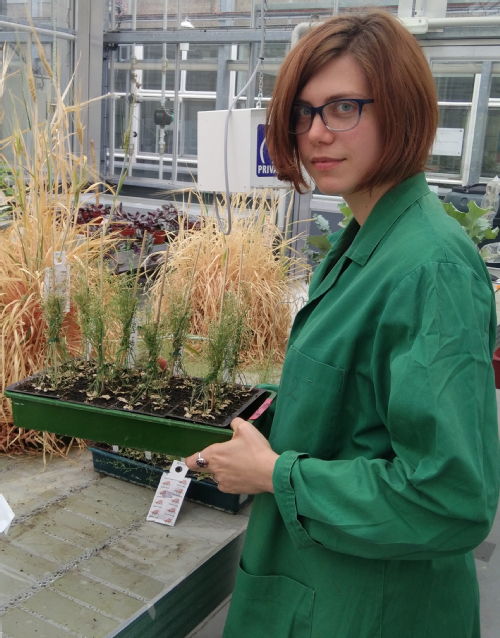United Kingdom
June 18, 2018
- Plants could be genetically rewired to better resist disease, helping safeguard crop yields worldwide – new research by the Universities of Warwick and York
- Defensive feedback control system developed – enables plants to strengthen their defences to withstand attack by re-wiring existing gene connections
- System uses same approach as aircraft autopilots use to counteract turbulence
Plants can be genetically rewired to resist the devastating effects of disease – significantly reducing crop waste worldwide – according to new research into synthetic biology by the University of Warwick.

Iulia Gherman (Phd student in Synthetic Biology, Dept. of Engineering at Warwick, joint first author on the paper)
Led by Professor Declan Bates from the Warwick Integrative Synthetic Biology Centre (WISB) and Professor Katherine Denby from the University of York, who is also an Associate member of WISB, researchers have developed a genetic control system that would enable plants to strengthen their defence response against deadly pathogens – so they could remain healthy and productive.
When pathogens attack crop plants, they obtain energy and nutrients from the plant but also target the plant’s immune response, weakening defence, and making the plants more vulnerable.
Building on experimental data generated by Prof. Denby, Professor Bates’ group simulated a pathogen attack in Arabidopsis plants, and modelled a way to rewire the plants’ gene network, creating a defensive feedback control system to combat disease - which works in much the same way as an aircraft autopilot.
Just as an aircraft’s autopilot control system detects disturbances like wind gusts or turbulence and acts to reject them, this new plant control system detects a pathogen attack, and prevents the pathogen weakening the plants’ defence response.
This method could render crops more resilient against disease, helping mitigate crop wastage throughout the world. Since the system can be implemented by re-wiring plants’ natural defence mechanisms, no external genetic circuitry needs to be added.
Declan Bates, Professor of Bioengineering at the University of Warwick’s School of Engineering, commented:
“Disease, drought and extreme temperatures cause significant yield losses in crop plants all over the globe, threatening world food security. It is therefore crucial to explore new ways to develop crops that are resilient to pathogen attacks and can maintain yields in challenging environments. This study shows the enormous potential of using feedback control to strengthen plants’ natural defence mechanisms.”
Katherine Denby, Professor of Sustainable Crop Production and Director of the N8 AgriFood Resilience Programme at the University of York commented:
“Minimising crop waste is obviously an essential part of creating a more sustainable food system. What is exciting here is applying engineering principles to plant biology to predict how to re-design plant gene regulation to enhance disease resistance. We use re-wiring of existing genes in the plant to prevent pathogen manipulation”
The next steps of the research will be to take the theory into the lab, and experimentally implement the defensive feedback control system in plants.
The research, ‘A Framework for Engineering Stress Resilient Plants Using Genetic Feedback Control and Regulatory Network Rewiring’, is published in ACS Synthetic Biology, a journal of the American Chemical Society.
It is authored by Declan G. Bates, Mathias Foo, Iulia Gherman, Peijun Zhang, and Katherine J. Denby.